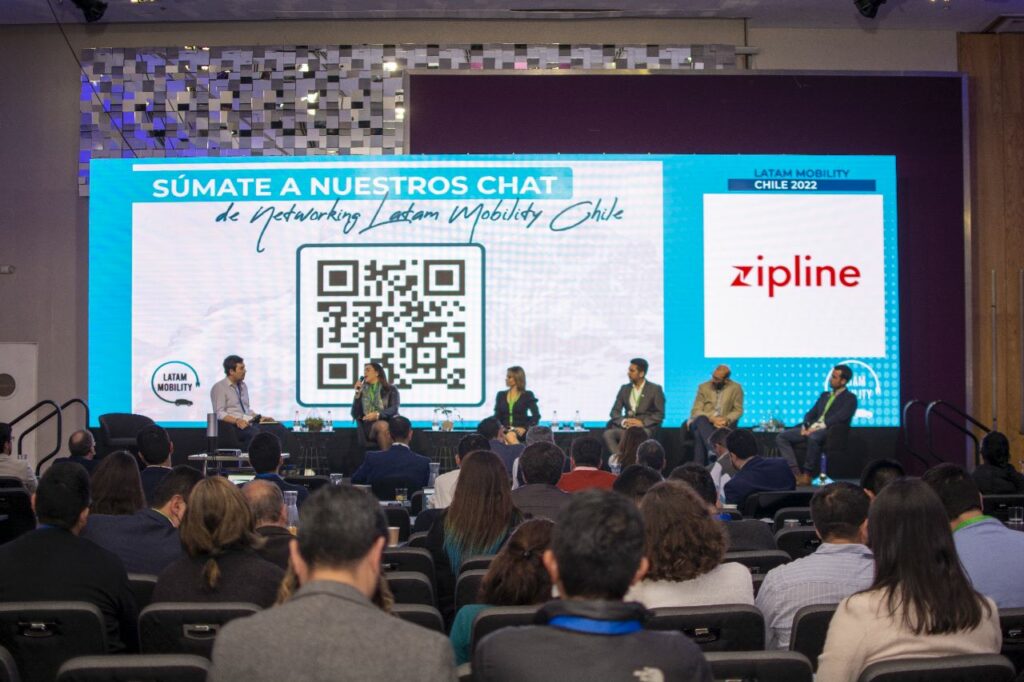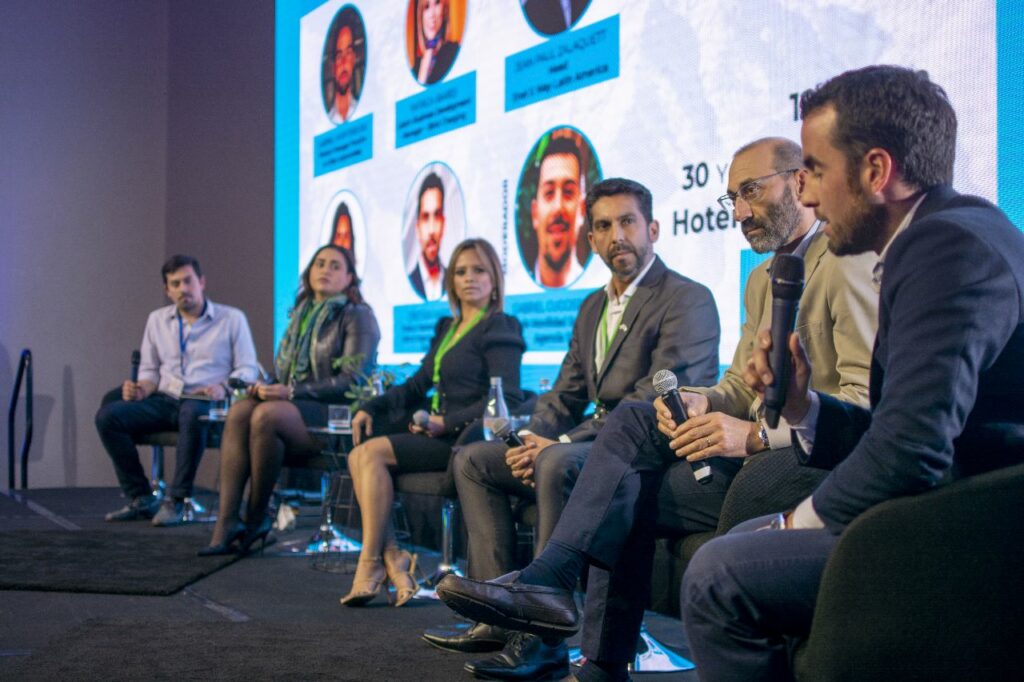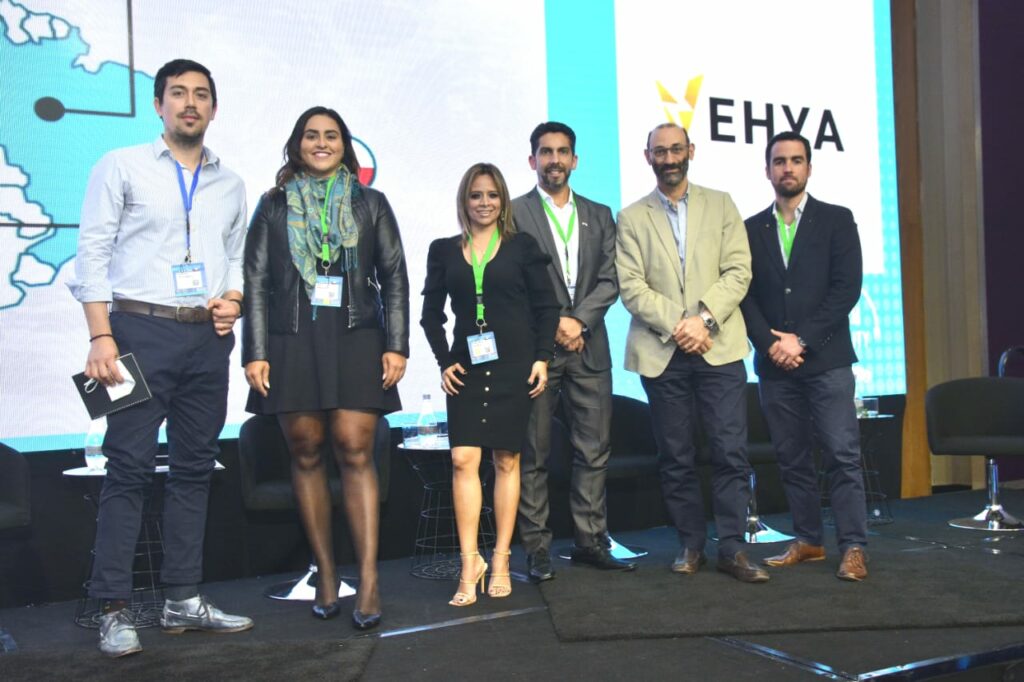
Blink, Enel X, Porsche, ABB and Vehya: Focus on Charging Infrastructure in Latin America

One of the fundamental points to advance towards the transition to clean fuels in Latin America is the development of charging infrastructures in the region, which presents important challenges, not only for vehicle developers and manufacturers, but also for the massification of these new technologies.
This key issue in the development of electromobility had its space in the face-to-face meeting “Latam Mobility: Chile 2022“, through the panel: “Current Trends and Perspectives for the Development of Charging Infrastructure for Electric Vehicles“, which took place last Tuesday, August 30 at the W Santiago Hotel in the Chilean capital.
The panel was attended by Patricia Baires, Latam Business Development Manager of Blink Charging; Daniela García, LATAM Business Development Manager of Vehya; Jean Paul Zalaquett, Head of Enel X Way Latin America; Cristian Martin, Product Marketing Specialist for the E-Mobility business of ABB Chile, and Gabriel Montenegro, Product Manager Porsche of Ditec Automóviles, under the moderation of Gabriel Guggisberg, Head of Sustainable Mobility of Agencia SE.
Guggisberg began the panel by commenting on the great challenges presented by charging infrastructures for the public and private sector, an essential element for the promotion of electromobility in the region, and also as an incentive for the end user.
Latin America: A Growing Market
Patricia Baires, representative of Blink Charging, a company with 13 years of experience offering charging infrastructure, said that Latin America, unlike the U.S., has grown more towards fleet mobility. “We seek to advise clients on optimizing resources related to the electrification of their vehicle fleets, as well as identifying their needs, and understanding how the whole process works.”
On the other hand, Baires considers it important to offer initiatives prior to the introduction of electric vehicles (EVs) and the construction of infrastructure, and gave El Salvador as an example: “A new law was recently signed that promotes the tax-free import of EVs as well as charging stations. These initiatives should be prior, so that companies and organizations take them as a starting point”.
In addition, the executive pointed out that “at Blink Charging we not only offer equipment and infrastructure, but we also contribute to the formulation of standards, laws or regulations that can promote electromobility and the development of the sector in some Latin American countries”.
User Service
Regarding the service provided to the end user, Gabriel Montenegro, representative of Porsche, said that one of the concerns of its customers is public charging outside the city of Santiago, so his company incorporates technology to improve the shopping experience.
“To the users of our electric vehicle, Taycan, we offer home chargers, as well as the ‘Destination Charging‘ program, which looks for potential public charging points to offer it free of charge to the brand’s customers,” Montenegro explained.
However, the executive considers that there is still work to be done: “We need to make progress in electric power to expand the service. The call is for all those involved in Latin America to continue joining forces to be able to offer more and better solutions to our customers”.

Fast Charging
Jean Paul Zalaquett, representative of Enel X Way Latin America, a company providing integral technologies and services for electromobility, said that progress is currently being made in fast charging processes. “Of the 350 charging points we have, 78 are fast charging. It is a service that is in formation, and this type of charging has yet to mature commercially.”
In relation to the hubs, Zalaquett said that “they are a business innovation that can combine a fleet of vehicles with a public charging system connected to the cloud, as a large virtual battery, which allows on-demand consumption, contracting time-sharing and having a positive impact on companies”.
On the other hand, the executive of the company based in Rome, Italy, indicated that technology is advancing, and companies in the sustainable mobility sector must anticipate the needs of the market, as he also pointed out about the importance of investments: “To achieve a deployment of chargers and infrastructure it is essential the support of the State to achieve massification and meet the objectives”.
You may also be interested in: Public officials from Chile and LATAM position public transport as a key element for the mobility transition in the region
Reducing times
For his part, Cristian Martin, representative of ABB Chile, a company with more than 60 years in the country and over 100 branches worldwide, commented on the need to reduce loading times. “As developers we must think about reducing time, including heavy loads en route to facilitate the transportation of goods in the country.”
“At ABB we are pushing a fast charging system, the MegaWatt Charging System over 1 MW and up to more than 3MW for batteries over 340 kWh that charge in reduced times. In addition, we offer 360 kg systems that are capable of charging four vehicles simultaneously for service stations or hubs, with charging times of around 10 minutes,” Martin said.
In addition, Martin pointed out the need for suppliers to adapt to the needs of the market, with joint work between the different actors linked to electromobility and with international standards, in order to generate a harmonious ecosystem that promotes the development of the sector.
Adaptability + specialization
According to the needs in the region, Daniela García, representative of Vehya, a U.S. company specialized in electrification based on Artificial Intelligence, indicated that one of the characteristics that companies must currently offer is adaptability, due to the different requirements that exist in Latin America, as well as offering complete solutions.
In addition, the executive explained that currently one of the key points is to offer specialists. “The mobility process is linked to access to knowledge, and we must ensure that the workforce is ready to offer the different solutions, for example, in the installation or maintenance processes”.
Finally, the representative of Vehya, pointed out that her company has a presence in Brazil and is in the process of entering the Latin American market, while making synergies with the main companies and public entities in the region to offer integral solutions linked to electromobility and charging infrastructures.






